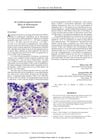Search
forLearn
5 / 52 resultslearn Vascular Endothelial Growth Factor
learn Low Level Laser Therapy
laser therapy for anti-inflammatory and likely insignificant hair regrowth effects
learn Microneedling
technique to create small wounds in skin to activate collagen production and hair growth
learn Minoxidil
An essential vasodilator with some anti-androgenic effects, has excellent safety record
Research
5 / 1000+ resultsresearch Scurvy Presenting With Cutaneous and Articular Signs and Decrease in Red and White Blood Cells
Vitamin C is essential to prevent scurvy and its symptoms.

research Neutrophil Extracellular Traps Impair Regeneration
White blood cells and their traps can slow down the process of new hair growth after a wound.

research Association Between Genetically Predicted Leukocyte Telomere Length and Non-Scarring Alopecia: A Two-Sample Mendelian Randomization Study
Shorter telomeres in white blood cells may increase the risk of a common type of hair loss.

research An Underrecognized Adverse Effect of Azithromycin: Agranulocytosis in a 67-Year-Old Man
Azithromycin can rarely cause a severe drop in white blood cells.

research Inhibition of the Pro-Oxidant Effects of Benoxaprofen on Polymorphonuclear Leucocytes by Retinol Acetate In Vitro
Retinol acetate can reduce the harmful effects of the drug benoxaprofen on white blood cells.
Community Join
5 / 1000+ resultscommunity You will lose hair if your prostaglandins aren't in balance
Prostaglandin balance affects hair loss, particularly in conditions like Lichen Planopilaris, where an imbalance can lead to hair follicle damage. Treatments mentioned include prostaglandin analogs and Pioglitazone HCL, with a focus on maintaining prostaglandin equilibrium for potential hair regrowth.
community The Worst Hair Loss Condition You (MAY) have: LPP
Lichen Planopilaris (LPP) is an autoimmune condition causing permanent hair loss and fibrosis, often misdiagnosed. Treatments include pioglitazone, topical corticosteroids, anti-inflammatory medication, and Jak inhibitors.
community Here’s my hair being dry, almost 5 months on finasteride and 8 months on minoxidil.
The conversation discusses a user's experience with hair loss treatments, specifically using finasteride for almost 5 months and minoxidil for 8 months. The user is considering switching to oral minoxidil and possibly dutasteride if not satisfied with the results, despite others noting progress and advising patience.
community 1 year 3 months on Finasteride - Still improving!
A user in their early twenties shared progress after 1 year and 3 months on 1mg daily oral finasteride, reporting no side effects and improvements despite initial shedding. They emphasized the importance of early intervention and noted that results come in waves, with shedding followed by regrowth.
community Help assure me- 100+ hairs lost post shower but don't brush between showers is normal, right?
The user is concerned about losing over 100 hairs in the shower and wonders if it's normal due to not brushing daily, stress, surgery, and PRP treatments. They are using minoxidil, spironolactone, iron, vitamin D, a multivitamin, pumpkin seed oil, and saw palmetto.